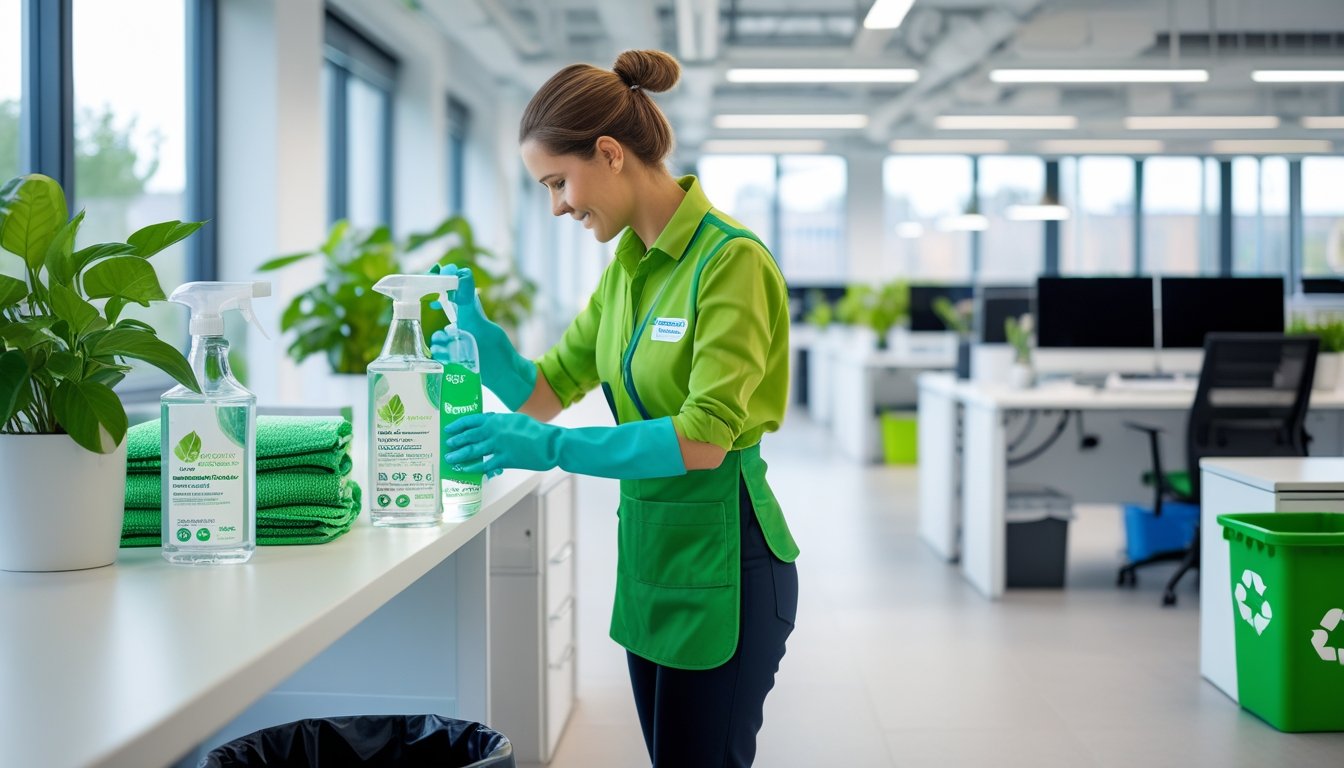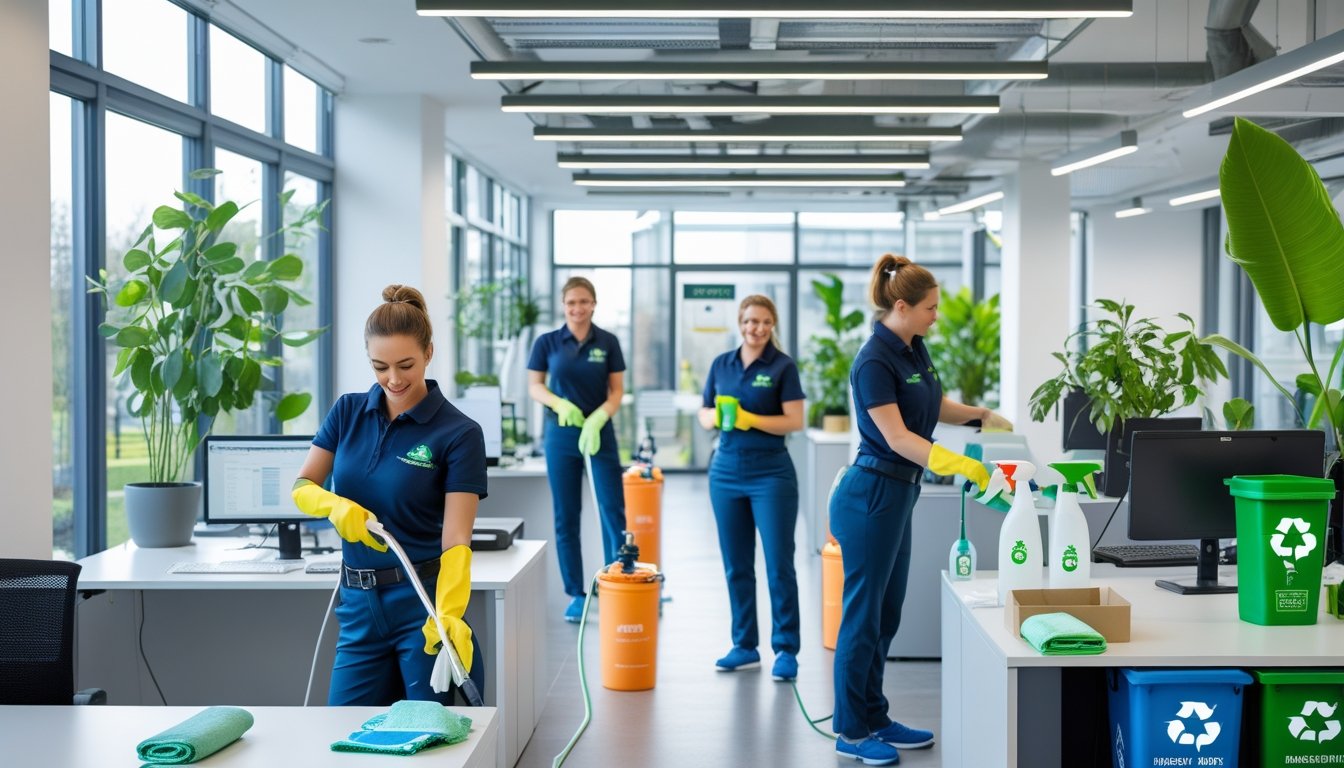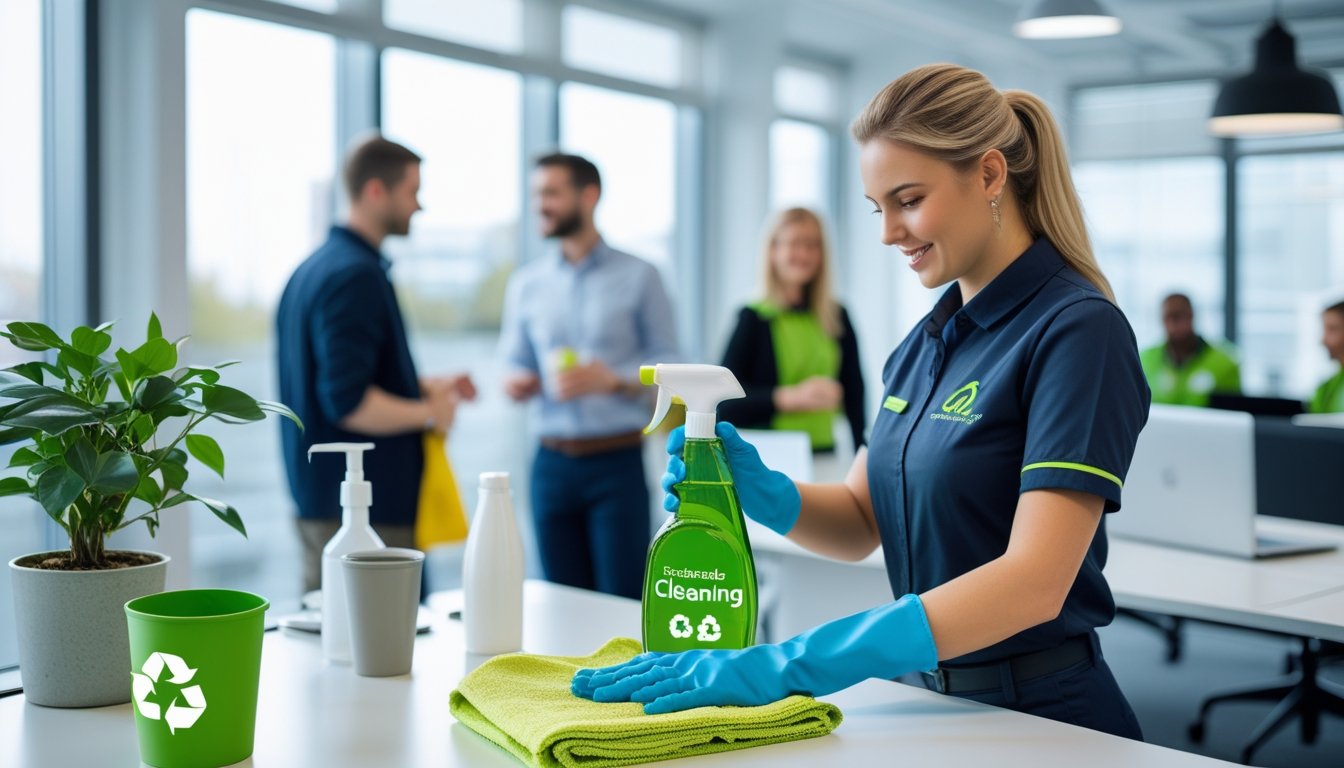Late updated: 08 Nov 2025 11:11
Written by: Amber Collins
Sustainable Office Cleaning Practices For UK Businesses: A Comprehensive Guide
Sustainable office cleaning practices are no longer just a trend for UK businesses but a strategic necessity that aligns with modern environmental goals. As companies worldwide grapple with their environmental impact, adopting green cleaning solutions is an effective way to minimise carbon footprints and safeguard employee health. By integrating eco-friendly practices, organisations not only contribute to a healthier planet but also create a cleaner and safer workplace for everyone.

Our focus is on practical actions that UK businesses can implement immediately. Switching to biodegradable products, utilising efficient water use protocols, and collaborating with sustainable suppliers are key components. These strategies reduce waste and support a company's commitment to sustainability without disrupting daily operations.
Let's explore how these changes can be put into action. The path to sustainability is not merely an ethical choice; it is a savvy business move that aligns with eco-conscious consumer expectations. As we delve into these practices, we'll provide actionable insights to transition smoothly into more sustainable operations.
Key Takeaways
- Sustainable office cleaning practices benefit both the environment and workplace health.
- Simple changes like eco-friendly products and efficient water use can make a big difference.
- Integration of sustainability is a smart business strategy for UK companies.
Key Principles of Sustainable Office Cleaning for UK Businesses
Incorporating sustainable cleaning practices has become essential for UK businesses aiming to reduce their environmental impact. Emphasising eco-friendly products and strategies helps organisations achieve healthier work environments, boosting employee well-being and aligning with corporate social responsibility standards.
What Are Sustainable Cleaning Practices?
Sustainable cleaning practices involve using methods and products that minimise environmental harm. This includes selecting eco-friendly cleaning agents, reducing waste, and conserving resources like water and energy. In the UK, businesses can opt for cleaning products with certifications such as EU Ecolabel or BSI Kitemark, ensuring they meet high sustainability standards. Additionally, we should train staff to properly use these products to maximise efficiency and effectiveness.
Implementing a waste reduction strategy, like recycling or reusing cleaning materials, further promotes sustainability. Biodegradable or reusable items, such as microfibre cloths, support this aim. Regular audits of cleaning procedures and materials offer opportunities for ongoing improvement. Overall, adopting such practices not only protects the environment but also sets a standard for integrity and responsibility in the workplace.
The Environmental Impact of Office Cleaning
Office cleaning can significantly impact the environment, particularly due to the chemicals in traditional cleaning products. Many contain volatile organic compounds (VOCs) that contribute to air pollution and pose health risks. By shifting to environmentally friendly cleaners, we can mitigate these effects. Such products typically exclude harsh chemicals and focus on natural ingredients.
Water and energy consumption during cleaning is another concern. Efficient equipment, like energy-saving vacuum cleaners or low-water-use systems, significantly reduces resource usage. Reducing packaging waste through bulk purchasing or opting for concentrated solutions further lessens our environmental footprint. When businesses integrate these strategies, they actively contribute to a more sustainable future.
Benefits of Green Cleaning for Workplace Health
Focusing on green cleaning offers notable advantages for workplace health. Non-toxic cleaning chemicals help create a healthier environment, reducing allergies and asthma triggers. Fewer chemicals in the air contribute to improved indoor air quality, which is vital for employee health and productivity. Employees are less likely to suffer from chemical sensitivities or exacerbated health conditions.
A clean and healthy office space leads to higher employee satisfaction and well-being. When workers feel cared for, there can be a noticeable increase in morale and productivity. By investing in green cleaning, companies show their commitment to employee health, which can lessen absenteeism and foster a positive work culture.
Corporate Social Responsibility and Regulatory Drivers
Corporate social responsibility (CSR) plays a crucial role in guiding sustainable cleaning endeavours. Businesses are expected to operate ethically, contributing to societal and environmental well-being. By adhering to sustainable practices, companies can enhance their reputation and strengthen stakeholder relationships.
Regulations, such as the Environment Act 2021, encourage organisations to limit their environmental impact. Compliance is not only mandatory but also beneficial for long-term success and competitive advantage. The shift towards sustainability aligns with societal demands, helping us attract conscientious employees and customers. Emphasising these principles reinforces our dedication to fostering an economically and environmentally sound business model.
Implementing Effective Eco-Friendly Office Cleaning Solutions

To achieve an environmentally sustainable office, adopting eco-friendly cleaning practices is essential. These efforts include selecting the right products, using efficient cleaning methods, managing waste, and instilling sustainable habits among staff.
Choosing Non-Toxic and Biodegradable Cleaning Products
The foundation of eco-friendly office cleaning lies in the selection of non-toxic, biodegradable cleaning products. We should prioritise eco-friendly solutions that reduce indoor air pollution and protect both health and the environment. Products that list plant-based ingredients and avoid synthetic fragrances are preferable. It's crucial for us to verify certifications like the EU Ecolabel, which ensures a high standard of environmental performance. This approach not only aids in maintaining a healthier workspace but also aligns with regulatory standards.
Efficient Cleaning Methods and Microfibre Use
Integrating efficient cleaning methods alongside traditional practices can significantly enhance our office's environmental footprint. Microfibre cloths should be a staple in our cleaning toolkit. They require less water and fewer chemicals while efficiently capturing dirt and bacteria. We might consider implementing a colour-coded system for different cleaning tasks to prevent cross-contamination. Furthermore, investing in green cleaning solutions with energy-efficient equipment can further reduce waste and increase operational efficiency.
Managing Waste and Promoting Recycling in the Office
Effective waste management and recycling are critical aspects of our green cleaning strategy. We need to set up easily accessible recycling stations throughout the office, clearly labelled for different materials. Encouraging staff to participate in waste segregation can be bolstered by providing educational materials and workshops on sustainable practices. Monitoring and evaluating our waste output can help us identify areas for improvement. This approach significantly reduces landfill contribution and supports our broader sustainability goals.
Training Staff and Encouraging Sustainable Habits
Implementing eco-friendly cleaning solutions requires active involvement from all team members. Conducting regular training sessions emphasises the importance of sustainable habits, empowering staff to make informed decisions. This includes proper use of non-toxic cleaning products and awareness of recycling protocols. Encouraging staff to adopt these habits extends beyond the workplace, fostering a culture of sustainability. By recognising and rewarding green practices, we reinforce positive behaviour and demonstrate our commitment to environmental responsibility.
Frequently Asked Questions

Our focus in this section is on practical ways UK businesses can enhance sustainability in their office cleaning efforts. We address common queries about eco-friendly cleaning strategies, including reducing plastic, sourcing supplies ethically, and training staff effectively.
What are the key components of an eco-friendly cleaning programme for UK businesses?
An effective eco-friendly cleaning programme prioritises the use of non-toxic, biodegradable cleaning products, emphasising water and energy efficiency. Adopting reusable tools and equipment designed for minimal environmental impact also play a crucial role. Additionally, waste reduction strategies such as recycling and composting are essential components.
How can businesses in the UK reduce plastic waste in their cleaning processes?
To tackle plastic waste, it's important to opt for bulk purchasing of cleaning materials in refillable and reusable containers. Switching to biodegradable wipes and concentrates that reduce the need for single-use plastics can greatly diminish plastic use. Encouraging suppliers to adopt a plastic-free policy further supports these efforts.
In what ways can UK companies ensure that their cleaning supplies are ethically sourced?
We recommend choosing products certified by reputable environmental and ethical labels, ensuring materials are sustainably harvested and free from harmful chemicals. Collaborating with suppliers committed to fair trade principles provides an added layer of assurance. Verifying supply chain transparency also helps guarantee ethical sourcing.
What steps should UK businesses take to train their staff in sustainable cleaning practices?
Training sessions focused on sustainable cleaning methods should be scheduled regularly. These can cover correct product usage, recycling procedures, and DIY eco-friendly cleaning solution preparation. Providing educational resources and encouraging staff feedback fosters a culture of continual improvement and engagement.
How can UK businesses measure the effectiveness of their sustainable office cleaning practices?
Measuring effectiveness involves setting clear sustainability goals and tracking progress through metrics such as reduced waste, energy savings, and decreased chemical usage. Conducting audits and gathering employee feedback can also help identify areas for improvement and success.
What certifications should UK businesses look for when selecting environmentally responsible cleaning products?
Businesses should look for certifications like the EU Ecolabel, which confirms a product's adherence to environmental standards. Programmes like the Ethical Consumer Best Buy Label or the FSC certification provide additional assurance that products meet ethical and sustainable criteria. These labels are benchmarks of environmentally responsible choices.
